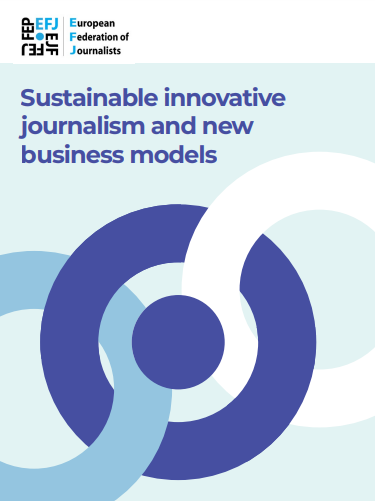
PODGORICA, August 9th, 2021 – While independent and investigative journalism is under threat in the digital ecosystem, innovation and creativity are essential for the development of sustainable news media.
This is stated in this years’ research Sustainable innovative journalism and new business models by the European Federation of Journalists (EFJ).
„Successful media are the ones that offer strong engagement with the audience in order to get fresh input but also to win loyalty and keep the public’s trust (and financial support) alive. This engagement is particularly important for local and hyperlocal news, where literally all the media outlets call on citizens to contribute to the content, and sometimes to the editorial process. This also implies getting connected to the local economy, for ethical reasons, but also for financial reasons. In terms of financing, good practices include the creation of non-profit foundations and tax benefits for individuals who support independent media“, concludes the author.
The main actors of this innovation are journalists themselves. They may innovate while working for a media outlet or by creating their own new media. Journalists’ unions and associations also have a role to play in promoting innovative and sustainable journalism, in particular on two issues: lobbying for media policies guaranteeing a diverse and open media market, and training of their members for new opportunities in journalism.
According to the study, sustainable media are also the ones that do not rely heavily on a single source of funding – advertising being a particularly weak option in recent years.
„Successful innovative news media cherish their independence and are often reluctant to be supported by advertising, but not all European regions can “afford” to sustain media: low-income communities may not dedicate part of their resources to this aim.“
For this reason, a diverse mix of funding is the key to sustainability.
„Success is not only a question of money but also of profile. While non-profit media are developing, the legal framework of media has to be chosen carefully, and may sometimes even be by-passed by registering as a charity, for example. For governments to develop a specific legal status for non-profit media (either cooperative or associative status for independent media) is definitely a way to clarify and regulate this evolution in an efficient way“, it is stated in the study.
Testimonies also point out weaknesses, for example, the lack of sustainability of the support provided by foundations.
„These may be useful in times of crisis but lack strategies for the long term. This makes it all the more important that public support for media exists in many countries in Europe: a real reflection needs to be developed on this topic. Another weakness would be to rely on only one – or a few – technologies: there is no innovation for paper-only or online-only media without other means of communication such as social media or podcasts“.
The author points out that it is interesting to note how some of the examples have developed from 2019 to 2021.
„This is particularly the case for Media part in France and Republik in Switzerland. These two relatively young organisations became reference points for quality journalism in their respective countries, to the extent that Mediapart literally became a media institution, helping smaller initiatives to develop. Concerning journalists’ unions and associations: these have a role in the process of innovation, through promoting and encouraging initiatives. As representatives of media workers and defenders of their rights, journalists’ organisations have a responsibility to promote a pluralistic and diverse media ecosystem and to engage with the public authorities in their countries to do this. Taking the examples in this survey from Hungary, Poland, Slovakia and Slovenia together, we can see that there is a place for new, independent and sustainable journalism in Europe, even in a “hostile” political and economic environment“.